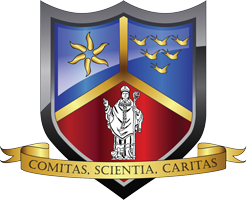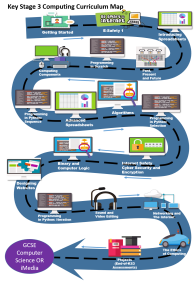Computing
Meet the Department
- Mr Fegan – Subject Leader of Computing
- Mrs Forster-Simmons – Second in Department
- Ms Cook – Teacher of Computing
Introduction
Pupils studying Computing and ICT at St Richard’s Catholic College will develop a fundamental understanding of computing and its core principles of information and computational thinking. An integral part of learning includes the opportunity for pupils to explore technology in a rapidly changing world and its impact on society. Pupils will build on their knowledge and understanding of digital literacy to allow them to stay safe in the digital world they now live in.
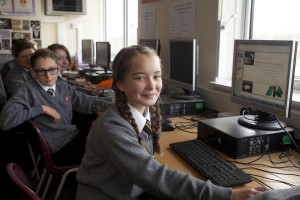
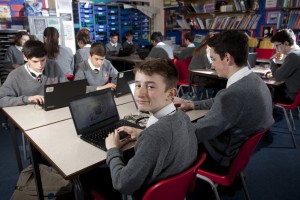
Why Study Computer Science?
It is a great way to develop critical thinking, analysis and problem-solving skills, which can be transferred to further learning and to everyday life. Pupils who want to go onto higher study and employment in the field of computer science, will find it provides a superb stepping stone. Having a GCSE in Computing provides opportunities across a wide range of industries such as engineering, software companies, consumer electronics, telecommunications, security industry, medicine and many of the different sciences.
Progression from GCSE right through to degree is primarily through Computing and Mathematics courses, however having an understanding of programming will also be beneficial if you are thinking of going into the field of medicine or science, especially physics. Below is a list of some university degrees that have programming included in their courses.
BSc Computer Science and Physics at the University of Edinburgh
BSc Computer Science and Physics at the University of Aberdeen
BSc Physics at Imperial College London:
“Physics is a practical science and relies on data, so physicists need to understand how data is generated and how to analyse it. This covers a wide range of skills including the ability to use apparatus in the laboratory, to use computers to make calculations and analyse data, and to carry out project work”.
Aims
The department firmly believes that following the National Curriculum in computing all pupils will:
Understand and apply the fundamental principles and concepts of computer science, including abstraction, logic, algorithms and data representation.
Can analyse problems in computational terms, and have repeated practical experience of writing computer programs in order to solve such problems.
Can evaluate and apply information technology, including new or unfamiliar technologies, analytically to solve problems.
Be responsible, competent, confident and creative users of information and communication technology.
Computing curriculum at St. Richard’s
KS3
Pupils are taught in mixed ability groups in Years 7-9. In Year 7 there is a nurture group for the SEN pupils to help ease their transition into life within the college. In Year 7, pupils have two 50 minute lessons, in Year 8 they have one 50 min lesson and in Year 9 they have 1.5 lessons over two weeks.
KS4 GCSE Computer Science
GCSE Computer Science
GCSE Exam Board: OCR (J277)
Contact: Mr Fegan
At Key Stage 4, the pupils can undertake study for a single award GCSE in computer science. Computer science is a practical subject where pupils can apply the knowledge and skills learned in the classroom to real-world problems. It is an intensely creative subject that involves invention and excitement.
Choosing GCSE computer science will be the perfect preparation for pupils who want to go on to study computer science A Level and beyond. The qualification will also provide a good grounding for other subject areas that require computational thinking and analytical skills such as Mathematics and the Sciences (especially Physics). Due to the challenging nature of the course, pupils who are predicted to achieve a 7-9 grade in Mathematics would be most suitable, however hard work and a passion will not exclude you from the course.
COURSE CONTENT
The GCSE covers two units of work:
-
-
-
- Unit 1: Computer Systems – Unit 1 builds on skills and knowledge from KS3 focusing on Systems Architecture, computer memory and storage, computer networks, connections and protocols, Network security and system software and ethical, legal, cultural and environmental concerns associated with Computer Science.
- Unit 2: Computational Thinking, Algorithms and Programming – Unit 2 builds on the knowledge and understanding gained in Unit 1, encouraging pupils to apply this knowledge and understanding using Algorithms. Pupils will develop their skills in algorithms and programming fundamentals, producing robust programs, Boolean Logic and programming languages and different integrated development environments.
-
-
Practical Programming Project
All pupils must be given the opportunity to undertake a programming task(s), either to a specification or to solve a problem (or problems), during their course of study. Pupils may draw on some of the content in both components when engaged in Practical Programming.
ASSESSMENT
Units 1 and 2 are both assessed through a 1 hour 30 minute examination paper set and marked by OCR and are both worth 50% each of the final GCSE grade. The exam papers have a mixture of short and long-answer questions. Unit 2 is divided into two sections, section A and section B. Section A is worth 50 marks, and assesses students’ knowledge and understanding of concepts of Computer Science. Section B is worth 30 marks and assesses students’ Practical Programming skills and their ability to design, write, test and refine programs.
BENEFITS OF THE QUALIFICATION
It is a great way to develop critical thinking, analysis and problem-solving skills, which can be transferred to further learning and to everyday life. Pupils who want to go on to higher study and employment in the field of computer science will find it provides an essential stepping stone. Having a GCSE in Computer science provides opportunities across a wide range of industries such as engineering, software companies, consumer electronics, telecommunications, security industry, medicine and many of the different sciences.
PROGRESSION
Primarily A Level computer science and Mathematics courses, however understanding programming will also be beneficial if you are thinking of going into the field of medicine or science, especially physics. Below is a list of some university degrees that have programming included in their courses:
- BSc Computer Science and Physics at the University of Edinburgh or University of Aberdeen
- BSc Physics at Imperial College London: “Physics is a practical science and relies on data, so physicists need to understand how data is generated and how to analyse it. This covers a wide range of skills including the ability to use apparatus in the laboratory, to use computers to make calculations and analyse data, and to carry out project work”.
KS4 iMedia
KS4 iMedia
Creative iMedia (IT)
Exam Board: Edexcel
Contact: Ms Cook
INTRODUCTION
The UK is a world leader in the creative digital industries, such as in the creation of visual effects for films and computer games. However, there is growing recognition that we need to build on and improve the UK’s capability and capacity for technical innovation and creativity in this area.
The OCR Cambridge Nationals in Creative iMedia has been designed to engage and enthuse young people with an interest in creative iMedia, for example digital graphics and animations, interactive multimedia products and pre-production skills.
QUALIFICATION TITLE AND EQUIVALENCE
OCR Cambridge Nationals Certificate in Creative iMedia. This qualification is equivalent in level and teaching time to one GCSE at grades A*-C.
COURSE CONTENT
- Unit R081: Pre-production skills
- Unit R082: Creating digital graphics project.
- Unit R085: Creating a multipage website project.
- Unit R886: Creating a digital animation project.
ASSESSMENT MODEL
- Unit R081: Written examination – An examination set and marked by OCR. 1hr 15 minutes.
- Unit R082: Creating a digital graphics – Project set by the exam board
- Unit R085: Creating a multipage website project – Project set by the exam board
- Unit R086: Creating a digital animation project – Project set by the exam board
PROGRESSION
This qualification provides a broad and solid foundation for further study of various aspects of creative computing, such as graphic design, web design, computer games design and interactive media. It supports progress to further study, including:
- Level 3 GCE Media Studies, ICT
- Level 2 & 3 Cambridge Technicals in IT and Media
- Level 2 & 3 Apprenticeships
- Level 1 & 2 Vocational Qualifications in Creative and Digital Media, IT Practitioner
Assessment in Computing and ICT
The Computing and ICT department follow the school’s assessment policy of awarding a pupil a St Richard’s score on a 1-9 scale. In Year 7 pupils will be awarded a St Richard’s score between 1-5, Year 8 2-6 and Year 9 3-7. At KS4 pupils St Richard’s score along with Fischer Family Trust score will be used to set a aspirational target for the end of Year 11.
Pupils’ progress throughout KS3 will be based on how well they do during tests that take place at the beginning of the year and at the end of the year. Two further tests take place during the school year. During KS4 work is marked using GCSE grades 1-9. Past paper questions are marked according to exam board mark schemes.
Exam Success
There is a strong culture of academic success in the Computing Department. Pupils expect and always do exceptionally well.
In 2023:
Computer Science:
100% achieved 4+
69% achieved 6+,
47% achieved 7+
iMedia:
100% achieved Pass (4+),
50% achieved Merit (7+),
36% achieved Distinction (8+).
Extra-Curricular Activities
Girls Raspberry Pi Club
Code Club
Cyber Security Club
Links to resources
BBC Bitesize Computing
YouTube Videos
